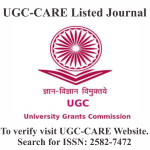SKILL DEVELOPMENT IN THE CONTEXT OF NATIONAL EDUCATION POLICY 2020 IN REFERENCE OF UP AND CBSE BOARDS
DOI:
https://doi.org/10.29121/shodhkosh.v5.i6.2024.6460Keywords:
Skill Development, National Education Policy 2020, Curriculum of Cbse Board, Curriculum of U.P. Board.Abstract [English]
Skill development is a challenge for modern India and even after completing education students are considered ineligible is some fields. Skill development is the essence of the store house of knowledge. To overcome the deficiency in the number of students opting for skill development, the government has given more attention in this direction through Nationa Education Policy 2020 which has the potential to play a vital role and strengthen the student technically. It is vital for attracting the attention of the students towards skill development-related courses at the higher secondary level itself and will be enabling them to use this acquired knowledge in their routine life. Realizing its significance, the nation is gearing to strengthen the modern education system through implementation of skill development related courses in senior secondary level schools of CBSE and Uttar Pradesh board and hence it has been included as a land mark point in NEP 2020.
References
Acadecraft. (2023). National Education Policy 2020: Curriculum structure and implications. Acadecraft. https://www.acadecraft.com
CBSE. (2025). Skill education curriculum 2025. Central Board of Secondary Education. https://cbseacademic.nic.in/skill-education.html
Dwivedi, J. (2019). Education in the medieval period. Delhi University. Research Gate. https://www.rg.net/publication/32887267
Fekete, B. M., & Khanna, M. (2012). Impact of vocational training and skill development on economic growth in Pakistan. Journal of Vocational Training and Skill Development, January.
Gupta, R., & Gupta, N. (2019). Vocational and technical education in India: Policies and practices. New Delhi: Atlantic Publishers.
Hottinger, B., & Kjaer, N. (2022, August 9). Explained: Why skill development is key to inclusive growth. India Today. https://www.indiatoday.in/education-today/featurephilia/story/explained-here-s-why-skill-development-is-a-key-to-inclusive-growth-1985778-2022-08-09
https://cbseacademic.nic.in/web_material/Curriculum24/SkillSubjects_SrSec2023.pdf
https://ervet-journal.springeropen.com/articles/10.1186/s40461-019-0078-y
https://www.education.gov.in/sites/upload_files/mhrd/files/NEP_Final_English_0.pdf
Kant, R. (2012). Educational policies in India: Historical perspectives. New Delhi: APH Publishing.
Kumar, D. (2018). Education in SCERT India: Issues and challenges. Journal of Research in Education and Training, 8(2), 791–795. https://doi.org/10.2249-2496
Kumar, R., Mandava, S., & Gopanapalli, V. S. (2019). Vocational training in India: Determinants of participation and effect on wages. Empirical Research in Vocational Education and Training, 11(3), 1–20. DOI: https://doi.org/10.1186/s40461-019-0078-y
Kumar, S. (2018). Colonial education policies and their impact on Indian society. Journal of Indian Education Studies, 34(1), 45–59.
Lal, R. B., & Sharma, S. D. (2012). History, development, and problems of Indian education. R. Lal Book Depot.
Masih, A., & Rubina, R. (2023). Teacher education in India: Issues and challenges under NEP 2020. Asian Journal of Education and Social Studies, 45(3), 87–98. https://doi.org/10.9734/ajess/2023/v45i3912
Meenakshi, S. (2023). NEP 2020 and its vision: A futuristic perspective on education. In NEP 2020: A Bridge Towards Modern Education (pp. 166–174). NB Publications.
National Education Policy 2020. (2020). Ministry of Education, Government of India. https://www.education.gov.in/nep2020
Rajpura, P. (2024). National Education Policy 2020: Transforming Indian education. Contemporary Education Review, 12(1), 14–26. https://doi.org/10.1080/cer.2024.112345
Saini, M. (2023). National Education Policy 2020 and libraries: A literary review. Studies in Library and Educational Policy, 3(4). https://doi.org/10.55529/slep.34.13.23
Sharma, D. (2017). The relevance of Buddhist education in the present context. International Journal of Applied Research, 3(7), 1442–1445.
Singh, R. (2024). A critical study of the National Education Policy 2020. Journal of Intellectual Property Right Law, 7(2).
Soni, V. (2023). Libraries and innovation in the framework of NEP 2020. Indian Journal of Library and Information Science, 17(4), 201–210.
Upmsp. (2025). Academic calendar. Uttar Pradesh Madhyamik Shiksha Parishad. https://prereg.upmsp.edu.in
Yadav, S. P., & Yadav, V. (2019). History, development, and problems of Indian education. Rajdhani Publishing House.
Downloads
Published
How to Cite
Issue
Section
License
Copyright (c) 2024 Priti tomar, Dr. Mumtaz Sheikh, Dr. Anoj Raj

This work is licensed under a Creative Commons Attribution 4.0 International License.
With the licence CC-BY, authors retain the copyright, allowing anyone to download, reuse, re-print, modify, distribute, and/or copy their contribution. The work must be properly attributed to its author.
It is not necessary to ask for further permission from the author or journal board.
This journal provides immediate open access to its content on the principle that making research freely available to the public supports a greater global exchange of knowledge.




















